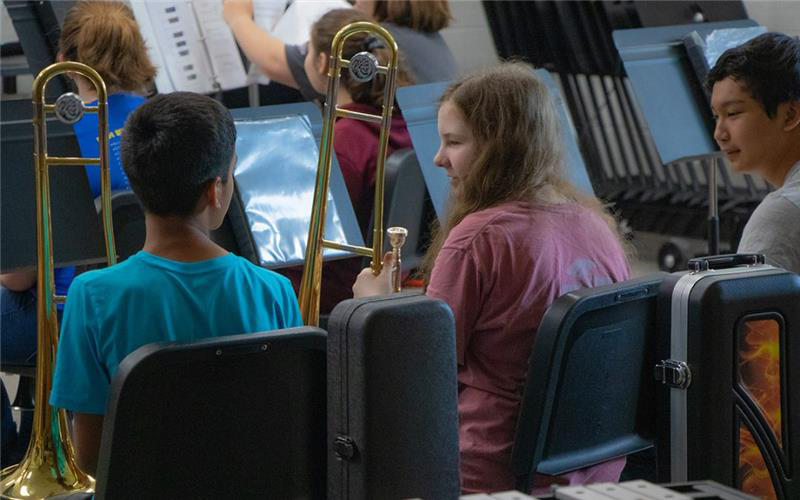As most of us understand, we have few behavior problems in our classes with bands. The students are, by in large, among the best students in our schools. They are involved in a quality activity, and each of them wants to be a part of an interesting and valuable experience. Nonetheless, at times we face less-than-ideal conduct. A thoroughly productive atmosphere is essential for making music of any kind.
In this article, I am going to talk about two approaches that are important. First and foremost, we as directors must accept OUR responsibilities for establishing a significant, important learning environment. Finally, I will address the students’ responsibilities.
In most schools, a syllabus or handbook is required. If not, it is highly recommended. Students and parents need a written document which establishes rules, regulations, expectations, and rehearsal and performance dates they must accept as responsibilities. This syllabus should also provide a statement of the overall goals of the program and include ideal personal goals for everyone in the ensemble, i.e., an explanation as to how a member of the (elementary, middle, or high school) band would approach everyday rehearsals, proper decorum, productive deportment, effective rehearsal attitude, and the committed execution of responsibilities.
As directors, we need to establish and maintain routines. Routines create a comfortable orderliness. They create calm, customary, normal rehearsals. They craft rehearsals that students can predict and come to expect. Here are some ideas that can assist.
Part One – The Director’s Job
Make certain the room is neat and clean, and the chairs are set up for rehearsal. Clean the space to make it conducive to learning and to serve as a simple way to help them understand that this is organized.
Meet the students at the door as they report to class. Smile. Use their name. Ask them how they are today. Engage them in a brief but personal conversation.
Help students to understand their routines. They need to know how they get their folders and where they stow their belongings neatly… NEATLY! They need to know how they assemble their instruments and what expectation you have for a personal warmup without loud, unmusical noise or any playing that is not connected with current ensemble literature or technical efforts like scales.
Post your rehearsal plan on a bulletin board or in a daily email so that students know what to expect. Use a projector, if possible, to display the agenda on a screen during rehearsal. The agenda should include your warmup, technical and fundamental components. Then, be specific with your repertoire. Use measure numbers for the students to see what is being targeted.
Every day needs to include:
- A quick and quiet attendance check.
- A check for required materials…. like pencils.
- A music theory component which might include vocabulary or rhythm patterns which are specific to your literature.
- Most important, most of your rehearsal, should be spent on literature. Go directly to those measure numbers you have selected. Do not start at the beginning of a piece every day. Like practicing, we do not need to work on things we can play. We need to practice sections we can’t play. Rehearse elements within the repertoire where the students do not display fluency. Vary the literature in the rehearsal. Fast piece, fast piece, fast piece is not varied enough. Students need variety and some soothing ballad-like sounds, too. In fact, the soothing sounds and tempos can help everyone to relax and make beautiful music.
Sometime in your rehearsal… not at the end of rehearsal… it is too hectic and sometimes rushed… you need to include a brief period of announcements. Ask that students give you their attention during this period. Information is golden.
Before dismissal, run a performance of one of the pieces or a part of that piece with which you have been working. Positive reinforcement is mandatory.
Dismissal – Be certain everyone understands to leave the room tidy. If appropriate, “put your chairs/stands away.” Still no time for loud or rowdy behavior. Just as you met them at the door upon entry, offer thanks, positive comments, and complimentary remarks about a good rehearsal as they leave. Help them leave the band room with a continuing positive attitude. Praise them for a good rehearsal. Give individuals time with you. Help them leave happy.
One can see this organization will create an environment where students will understand the purpose and goals of your rehearsal. Remember: Students want/expect structure and will more likely display appropriate behavior that is outlined and emphasized.
Part Two – The Students’ Job
Why do students misbehave? Now, that’s a question for which we would all like a definitive answer. If our expectations are clearly outlined, and we have discussed them in class, we must assume that students are “choosing” the wrong behavior. A student may seek attention, hope to amuse a group of students, or they are testing the teacher’s boundaries. They must learn to self-regulate. We must learn to trust the students.
It follows then that students must be able to describe characteristics of productive and unproductive behavior. They must know how disruptive behavior will be handled. (It’s true that not all unacceptable behavior will be treated alike but outline a general sense. The first offense asks for a modification. The second offense might need a private meeting addressing the issue. They must understand what the consequences of continuing problems might be.)
Frequent reminders need to be presented to the entire ensemble, so they continue to understand the expectations. Frank yet gentle discussions, just like rehearsals, are effective reminders of the road to productivity.
Finally – Closing Thoughts.
- Understand, by your example, you display precisely what you are seeking in behavior and professional standards. Dress and act professionally. It is effective.
- Have a plan for intervention. Matters that are unproductive or disruptive need to be addressed. Be specific. Disruption by one individual affects every student in the ensemble.
- In any intervention, be calm and professional. Address, by name, the student/s who are causing the problem, “John, I know you can make better efforts for us.” Ask them to make better choices in their behavior. Keep from making this a class issue. Verbal warnings are important, but they should not be in loud, frightening voices. The students chose a behavior that was inconsistent. They need reminders from time-to-time
- Note the day and time of the incident and chronicle the event in your private journal.
- If a behavior is presented that is aggressive, combative, or threatening, do not hesitate to take this to your administrative officials. The safety and security of your students and your classroom is imperative.
- Be consistent, respectful, and always professional. As stated earlier, most behavior problems are caused by personal events at home or at school. Student stress is usually what causes serious disruptive issues. Minor issues can effectively be handled with periodic reminders.
I hope this discussion spurs some thought and makes every day in your environment more productive and enjoyable for everyone involved in your activity. By the way, did you notice that our jobs are more numerous than the students’ jobs?
That speaks volumes. We are the fountainhead. If we provide structure, we can expect our students to observe and conform. Behave yourselves.
About the Author
JOSEPH HERMANN, Director of Bands Emeritus, served at Tennessee Tech University for 28 years as Professor of Music. Hermann is sought after as a conductor, adjudicator, and speaker and has presented clinics, workshops, and has conducted around the world. His symphonic bands have been featured at national conventions; recordings of his ensembles have been issued as reference for music educators nationwide. Before his appointment at Tennessee Tech in 1989, Hermann was a director at the University of Arizona, Indiana University, and East Tennessee State University. He taught instrumental music at every educational level and supervised the Des Moines (Iowa) Catholic Instrumental Music Program.
Hermann is a member of the prestigious American Bandmasters Association, and in 2009-10, he served as its President. He is the recipient of the KKѰ Distinguished Service to Music Medal in Conducting and the TBΣ Paula Crider Outstanding Band Director awards. In 2015, Hermann was inducted into the Tennessee Bandmasters Hall of Fame. Mr. Hermann is affiliated as an Artist/Conductor/Clinician with Jupiter Band Instruments, Inc. and serves as their Senior Educational Consultant.
The content of this Blog article or Banded Story is the intellectual property of the author(s) and cannot be duplicated without the permission of KHS America and/or the author(s). Standard copyright rules apply.



 We look forward to the evolution of this exciting program, and welcome feedback on how we can further enhance the work that you do in music education.
We are excited to offer your program the opportunity to join the KHS America Academic Alliance today.
We look forward to the evolution of this exciting program, and welcome feedback on how we can further enhance the work that you do in music education.
We are excited to offer your program the opportunity to join the KHS America Academic Alliance today.